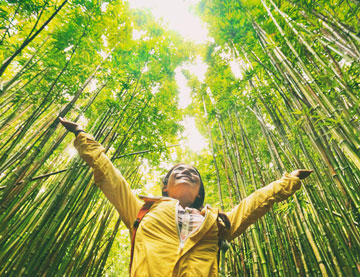Banner Image

There is no doubt COVID19 has disrupted all forms of routine, and for many tourism businesses, this pause has provided us with the opportunity for reflection to re-evaluate what we are doing and how we can better serve the educational travel sector.
We are seeing more school incursions, excursions and school camps placing greater value on experiential learning opportunities and making conscious decisions to include travel with a purpose.
People are moving away from materialistic outcomes to focus more on a humanitarian approach toward travel. There is a greater self-awareness to learn from others organically and a renewed sense of responsibility to the environment.
We are now seeing the tourism and hospitality sector pay close attention to these new travel values and starting to include more engaging experiences and sustainable practices to match this emerging need.
Travel operators and accommodation suppliers are responding positively and willing to do something about it, making the concept of sustainable travel a growing trend.
Three core pillars sum up the concept of sustainable tourism, and we have highlighted a few small changes you can make on your next school excursion or school camp to highlight what it is to be a sustainable traveller.
Reduce the Impact on the planet
The first Pillar of sustainable tourism is to include environmentally sustainable practices being reduce, reuse and recycle. Not only does this complement classroom teaching theories it can be incorporated as a theme of social responsibility across the excursion. Activities ranging from local beach clean-ups, visiting craft centres, upcycle projects, and visiting recycling centres they, all include concepts surrounding responsible trash management. There are plenty of ways to highlight these concepts with immersion activities that have a beneficial and tangible impact.
Saying no to plastic is one of the simplest ways to highlight a problem facing our planet today. Be a part of the solution by opting to bring your own reusable water bottle on tour. Not only will this cut back on plastic waste, but it will also reduce your carbon footprint. Almost all venues these days will have a water fill station and provide opportunities to refill your bottles. Some operators will even offer you branded bottles to reduce single-use plastics.
Support Local Economies
The second Pillar of sustainable tourism is providing tangible social and economic benefits for local communities. Many businesses across Australia have been affected by the coronavirus pandemic, and they are counting on local travellers' support as they recover. Scheduling dinner or lunches at a local restaurant or supporting the food market is an excellent way for students to interact with the local community and exposure to multicultural traditions is a learning experience in itself.
Including time to stop and browse local craft centres provides the opportunity for students to interact with local craftsmen and artisans as opposed to mass-produced chain stores which they most certainly will find in their hometowns. By purchasing locally made crafts and souvenirs and locally grown food ensures your contribution to the economy will have a direct and positive impact.
Try to include a local walking tour or take a bike tour. When walking or cycling, you can feel the natural environment so much more, and you notice things you would not ordinarily take note of from a coach, plus you're reducing your carbon footprint and supporting a local service provider.
Engage with local specialist guides they have a wealth of knowledge to pass on, and you're doing your bit to support the local community.
Travel with a Purpose
The third Pillar of sustainable tourism includes protecting our natural heritage, saving our native wildlife species and preserving cultural traditions.
Australia's wildlife is some of the most unique in the world. There are several organisations across Australia that are rescuing and rehabilitating native animals and these centres often provide valuable education programs highlighting the importance of protecting our wildlife. You can help by visiting these incredible animals in parks and sanctuaries across the country. If you would like to give back while travelling a great option is participating in authentic experiences that empower local communities. Not only will this provide you with a unique and memorable experience, but it also creates a positive impact.
There Is A Silver Lining
Knowing what to ask is a good start to working out how you would like to make your excursions meaningful and beneficial so consider the below few questions when planning your next school camp or school excursion.
- How does the company you are working with build cultural awareness?
- Does a portion of your trip support a local charity or include sustainable practices?
- Are your activities culturally respectful and do they aim to preserve local traditions?
- Are your suppliers local and do their operations support the communities directly?
In turn, you can make a significant contribution not only by the activities and destinations you chose to visit but by spreading a good word. Now more than ever, businesses need exposure and positive feedback.
The ramifications of this pandemic may have a bright side in that it could prove to be beneficial for local tourism in the long run. We are already seeing a whole generation of Australians who are falling in love with their backyards again and now realise just how incredible our country and tourism experiences are.
Author: ClaudineF
Claudine is a people connector with a passion for bringing together communities and organizations for good through travel. With a degree in global business, she left her home country to travel full time with her family while working remotely, designing educational programs and marketing content for international niche markets. “Seeing the positive change that travel inspires in young people is what I am passionate about sharing, adventure has a unique way of teaching you something new”
